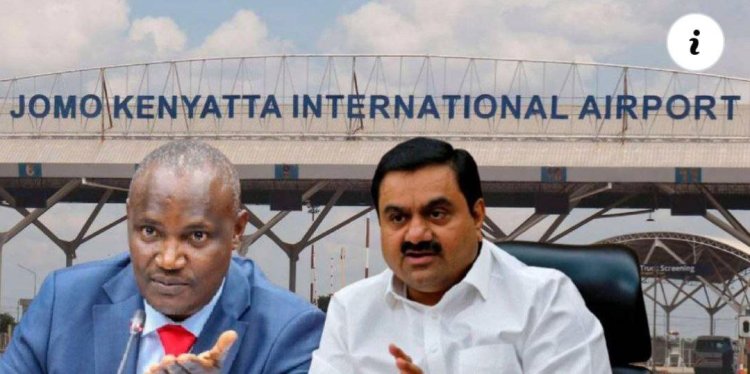National Treasury Sets 22 Conditions for Approval of Controversial Adani Airports Holdings Deal
The National Treasury has outlined 22 conditions, including absorbing JKIA staff, before approving the controversial Adani Airports Holdings deal. Read more about Cabinet Secretary John Mbadi's revelations.

In a significant move for Kenya’s aviation sector, the National Treasury has revealed that 22 stringent conditions must be met before the controversial Adani Airports Holdings deal can receive approval. Among the critical conditions outlined is the absorption of all staff at Jomo Kenyatta International Airport (JKIA), a key concern amid the looming privatization debate.
Speaking on the issue, Cabinet Secretary John Mbadi confirmed that the Treasury's terms are non-negotiable, aiming to safeguard the interests of Kenyan employees and ensure the country retains some oversight of its largest airport.
The potential takeover by Adani Airports Holdings has sparked heated discussions across the political and economic landscape, with stakeholders divided over the merits of privatizing one of East Africa’s most important aviation hubs.
The 22 Conditions Set by the National Treasury
While the absorption of JKIA staff is among the most prominent conditions, the National Treasury's comprehensive list covers a wide range of areas, ensuring that the deal does not negatively impact Kenya’s aviation sector or its economy. These conditions are designed to ensure transparency, protect local jobs, and maintain service quality at JKIA.
Some of the key conditions reportedly include:
- Absorption of all JKIA employees into the new structure under Adani Airports Holdings to prevent job losses.
- Retention of a Kenyan managerial presence, ensuring that the country's strategic interests in JKIA operations are safeguarded.
- Continued government oversight on safety and operational standards to meet international aviation regulations.
- Clear revenue-sharing agreements that ensure a portion of the profits from JKIA operations remains within the Kenyan economy.
- Regular performance reviews to assess the quality of service delivery and adherence to the terms of the agreement.
- Protection of airport infrastructure, ensuring that any developments or upgrades are in line with Kenya’s long-term aviation strategy.
- Commitment to environmental sustainability in all future operations and expansions at JKIA.
Absorption of JKIA Staff: A Key Condition
One of the biggest concerns regarding the proposed deal is the fate of the hundreds of staff employed at JKIA, Kenya’s busiest airport. The National Treasury has emphasized that all employees must be absorbed into the Adani Airports Holdings framework, without any reduction in job security or benefits.
This move is designed to prevent mass layoffs, which have been a point of contention in previous privatization efforts within the country. CS Mbadi made it clear that protecting the welfare of the employees is a top priority in these negotiations, as many workers have expressed anxiety about the future of their employment under a new, private entity.
Why the Adani Airports Holdings Deal Is Controversial
The proposal to hand over management of JKIA to Adani Airports Holdings, a subsidiary of India’s Adani Group, has been met with mixed reactions. Proponents argue that privatizing the airport could lead to increased efficiency, investment in infrastructure, and overall improved service quality. They also point to the Adani Group’s global experience in managing airports, particularly in India, where they have made significant strides in modernizing airport facilities.
However, critics of the deal worry that privatization could lead to a loss of national control over a critical asset, potentially making Kenya vulnerable to foreign interests. There are also concerns about how such a move could impact airport users, with fears of increased fees and changes in service standards under private management.
In addition, Adani Group itself has been a subject of controversy, with various allegations of corporate misconduct and environmental concerns surrounding some of its other ventures. This has fueled apprehension in Kenya, with stakeholders calling for thorough due diligence before any agreements are signed.
John Mbadi’s Role and the National Treasury's Position
John Mbadi, in his role as Cabinet Secretary, has been tasked with ensuring that any decisions made regarding the future of JKIA are in the best interest of Kenya. By placing 22 conditions on the table, the National Treasury is signaling its commitment to protecting both the Kenyan workforce and the nation’s long-term economic interests.
Mbadi has stated that while the government remains open to partnerships that can improve infrastructure and services, this cannot come at the cost of sovereignty or the welfare of the Kenyan people. By insisting on employee absorption and other stringent conditions, the Treasury is aiming for a balanced approach that benefits both investors and the country as a whole.
The Way Forward for the JKIA Deal
As the debate over the future of JKIA continues, the National Treasury's conditions will play a pivotal role in determining whether the Adani Airports Holdings deal goes through. Negotiations between the Kenyan government and Adani Group are ongoing, and it remains to be seen whether the company will agree to the full list of conditions or whether further revisions will be necessary.
For now, the focus remains on ensuring that any agreements align with Kenya’s economic goals while protecting the jobs and livelihoods of JKIA’s employees. The absorption of staff, in particular, will likely be a sticking point in the final discussions.
Conclusion
The National Treasury’s 22 conditions for the Adani Airports Holdings deal represent a clear attempt to balance foreign investment with the protection of Kenyan interests. As negotiations continue, the outcome of this deal will have lasting implications for Kenya's aviation sector, the future of JKIA, and the lives of the many employees who work there.
Whether the deal goes through or not, the spotlight is now on the Kenyan government and its ability to ensure that any future partnerships benefit the country without compromising its workforce or strategic assets.
What's Your Reaction?




















